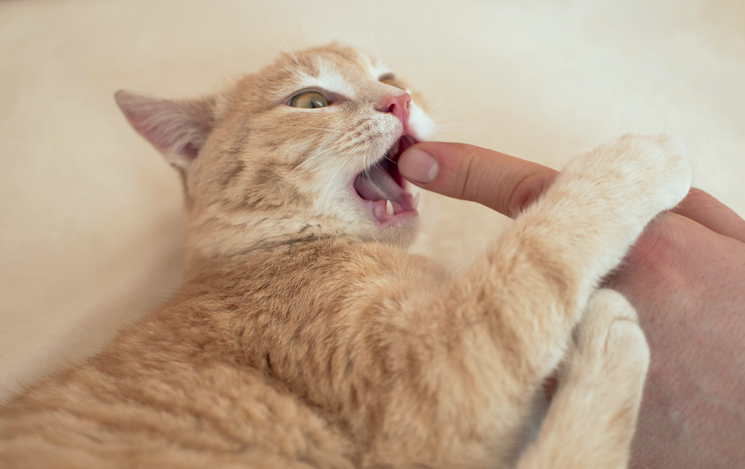Ever found yourself perplexed by your furry friend’s nipping habits? You’re scratching their ears, everything’s going well, and then—chomp! Not a full-on bite, but a gentle nip. What’s up with that? Well, you’ve come to the right place. Welcome to Best Friends Animal Hospital’s blog, where we make understanding your pets our priority.
Remember, while we love sharing insights, we’re not a substitute for professional veterinary advice. If you have concerns about your cat’s behavior, give us a call at (603) 625-2378 to make an appointment.
The Language of Cat Bites: Decoding the Mystery
Cats communicate in ways that can sometimes seem like a riddle to us humans. A gentle nip can mean different things depending on the context and the individual cat’s personality. In general, though, these little bites are usually either playful or affectionate. Read on to get the scoop!
Playful Nips: A Game or Something More?
Engaging in Play
When your cat is in a playful mood, they might give you a light nip. This is often part of their natural play behavior, which also includes pawing, pouncing, and leaping. Ever watched kittens play? They’re often practicing their predatory skills in a fun and safe environment.
The Importance of Toys and Enrichment
A cat’s playful nip is often an invitation to engage. Toys, puzzle feeders, or even a simple string can redirect their energy and fulfill their need for mental stimulation.
Affectionate Bites: Your Cat’s Version of a Love Tap
Bonding Time
Cats show affection in unique ways, and a soft bite can be their version of a hug or a kiss. You’ll often notice this when you’re having a special cuddle time, or when they’re purring contentedly in your lap.
Trust and Social Structure
When a cat gives you a gentle bite, they’re displaying a high level of comfort and trust. It’s a nuanced form of social interaction that stems from their early kittenhood experiences and their understanding of social hierarchies.
When to Be Concerned: Identifying Aggressive Bites
Cats are complicated creatures, and sometimes a bite is not just a playful nip or an affectionate gesture. If the bite is hard enough to break the skin, or if it’s accompanied by hissing and growling, that’s a red flag.
Signs of Aggression or Fear
Watch for ears laid back against the head, dilated pupils, and a lashing tail. These are indicators that your cat is either scared or irritated, and it might be time to give them some space.
Talking to Your Vet: When It’s Time for Professional Advice
If your cat’s biting behavior suddenly changes or becomes aggressive, consult your veterinarian. Behavioral changes could signal underlying health issues that require professional diagnosis and treatment.
Making an Appointment at Best Friends Animal Hospital
Please give us a call at (603) 625-2378 for an appointment. We’re here to help you understand your feline friend better and provide them with the best care possible. Understanding your cat is the first step towards a harmonious life together. Keep those lines of communication open, and if in doubt, remember, we’re just a phone call away.





